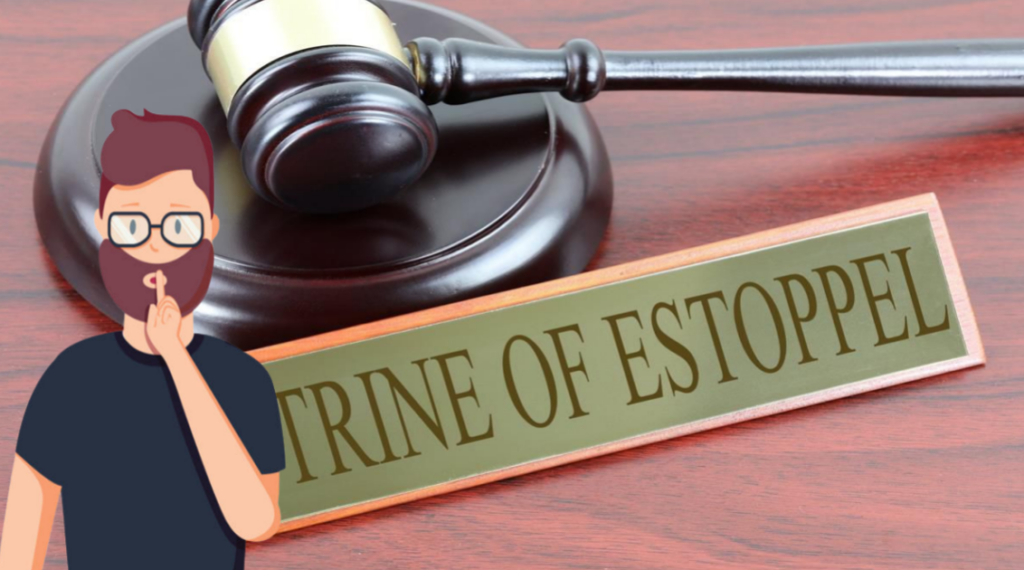
This article is written by Paras Chugh, student of BBA.LL.B. 4th semester from RNB Global University, Bikaner, Rajasthan.
Introduction
The principle of estoppel, which is dealt with in Sections 115 to 117 of the Indian Evidence Act of 1872, forbids a person from providing false evidence by forbidding them from making contradictory remarks in a court of law. This philosophy aims to prevent fraud against another person from being committed by one person. This concept holds that a person is accountable for whatever false claims they make, whether they were expressed verbally or by their actions.
Meaning of Estoppel
Estoppel is described as the circumstance when one person, through an act, omission, or declaration, has persuaded another person to think something to be true and convince that person to act on it in Section 115 of the Indian Evidence Act, 1872. The truth of that statement cannot under any circumstances be disputed by that individual or his representative in the lawsuit or during the proceedings. Estoppel is a legal notion that basically means one cannot dispute, contradict, or declare incorrect the preceding statement he made in court.
Exempli gratia,
1. Ishita, a successful businessman, wishes to purchase an automobile. She has a good friend named Dev who owns a valuable vintage automobile. Dev offers Ishita the opportunity to buy his car, which he has been preparing to sell for some time, when she contacts him to assist her in buying a car. Ishita purchases an automobile. The automobile eventually belongs to Dev. Dev argues that he had no title to the car when he sold it to Ishita. The judge ruled that Dev would be responsible and have to demonstrate his lack of title.
2. If Shiva works for business XYZ but claims otherwise in court, he will not be eligible to receive compensation from that company in the future.
Principles of Estoppel
Conditions for application of Doctrine of Estoppel
The doctrine of estoppel must meet the following characteristics in order to be used:
• The representation must be made by a single person, and it must be based on facts rather than legal requirements.
• The portrayal must make reference to an established fact.
• The other person must interpret the representation as being true if it is presented in that way.
• The recipient of the representation must act in accordance with the belief it conveys.
• A loss resulting from the representation must be experienced by the person to whom it is made.
Nature of estoppel
Despite being referred to as a principle under the Indian Evidence Act of 1872, the doctrine of estoppel is regarded as a substantive rule of law.
Types of Estoppel
There are two categories of judicial rulings.
Judgements in rem
This kind of verdict, which is given by a competent court, describes the status of the subject or object. For instance, a marriage may be established or ended by the family court. A ruling in rem is enforceable against all parties, regardless of whether they are involved in the action or not.
Judgement in personam
The judgments that determine the rights of the parties to a suit or procedure and are binding on the parties and their privies are known as judgments in personam.
Judgement not falling under the said jurisdiction
The application of the doctrine of estoppel will be ineffective if the court’s decision does not fall within the relevant jurisdiction. According to Section 44 of the Indian Evidence Act, 1872, a party may claim that the court rendering the judgment lacks jurisdiction over the subject or is acting dishonestly if they wish to prevent the application of the theory of estoppel.
What Is Estoppel By Deed
It is the notion that two parties can come to an understanding on particular facts by using a deed. This implies that none of him, his representatives, or anybody claiming to act on his behalf may contest the truth of the information set forth in the deed.
For instance, Jack Shroff decided to name Thomas Shroff, his daughter’s son, as well as Henry Shroff and James Shroff, his two children, in his will. Due to Henry Shroff’s influence, a third party acquired Thomas Shroff’s side of the property. James Shroff swore to this paper while being ignorant of the details in the deed. Thomas Shroff died without bearing a male offspring. Henry Shroff filed a lawsuit against the third party in order to take possession of the property. Henry Shroff would be stopped in this instance but not James Shroff because Wolf was uninformed of the circumstances underlying the conduct.
Estoppel by election
Aadhya, his maid, is offered Kantabai’s used automobile. Aadhya says she wouldn’t accept it for free out of kindness. Aadhya is told by Kantabai that she is free to accept it as a gift or to pay for it in accordance with her willingness. Aadhya has the choice of accepting it as a gift or asserting her claim by buying the car. Aadhya now pays for the car and takes control of it. After a year, Aadhya declares bankruptcy and requests that Kantabai return the funds she had given to her as payment for the car because she now desires to give it to her as a gift.
The doctrine of estoppel by election states that the person receiving the gift or asserting the right can only take use of one of them, not both. Meena is now unable to reconsider and choose the alternate course of action.
In a different instance, the petitioner received a land on a license rather than an interest basis. The contract’s terms and conditions indicated that, in the event of a disagreement, the chairman’s decision would be final. The petitioner received the land so they could develop an entertainment park there. While constructing the park, it was discovered that the required steps had not been performed for its establishment, leaving half of the site undeveloped, in violation of the terms of the contract. The court stated in the lawsuit that the facts of the case precluded the use of the doctrine of estoppel.
Unambiguous laws cannot be dodged
It was established in Sales Tax Officer v. Kanhaiya Lal that the notion of estoppel would not apply in situations when the law expressly and unambiguously declares that the plaintiff is entitled to redress. Any action that violates a law that is unambiguous and without exceptions is void, and the party that is impacted by it may initiate a lawsuit against the law, claiming estoppel. In contrast, if the law has an exception clause, a relaxation may be granted based on it. Estoppel may be asserted, as stated in the Delhi university v. Ashok Kumar decision, and the party would not be seen to be operating in violation of the law.
Estoppel by Convention
Estoppel by convention occurs when participants to a transaction assume the facts or the law, as was noted in the case of the Republic of India v. India Steam Ship Company Limited. Both parties or only one of them might hold this presumption. According to this principle, participants to an agreement could not dispute the presumptions made regarding the facts, as doing so would be unfair and result in injustice.
Exceptions to Estoppel
Following are the exceptions to the doctrine of estoppel
- Estoppel cannot be used against laws or regulations since both parties must have full knowledge of the facts in question for this theory to apply.
- It should not be in conflict with applicable laws or rules.
- It wouldn’t apply in situations where one participant acted or made a choice outside his or her authority.
- It cannot be used to challenge government
According to the clause, the immovable property’s tenant or any other party asserting a claim based on the tenancy may contest the landlord’s ownership of the property from the outset of the lease. The Section also states that a person who discovered an immovable property using a license cannot dispute that the person from whom he obtained the license, i.e., whose possession the immovable property was at the time he obtained his license, held the title.
Tenant- landlord relationship
A written contract or an oral agreement can establish a connection between a tenant and a landlord. The taking of possession of the property, the payment of rent, or other events may signal the start of the tenancy.
If X leases his land to Y, who takes possession of it and begins paying the rent, then X later sells the land to Z, Y may pay Z. In this case, Y and Z are the landlord and renter.
Title of the landlord cannot be denied
When a tenant first enters into a relationship with a landlord, when they are given possession of the property, and when they move into the premise, they have the right to object to any actions or items taken by the landlord that are not in accordance with the terms of the lease. A renter will never assert that the landlord lacks ownership of the property.
When a landlord files a lawsuit for default payment and eviction, the tenant cannot claim that the landlord no longer has an interest in the property, the judge said in Moti Lal v. Yar Md. According to Suraj Bali Ram v. Dhani Ram, the landlord’s title can only be contested once the tenant vacates the premises.
Title at the beginning
At the start of the tenancy, the tenant cannot dispute the title to the landlord. However, tenants have some rights that they can use, such as:
• He would not be barred from asserting that upon the death of the landlord, the property would be transferred or the title would be delegated to him and not to a third party.
• He could demonstrate that the landlord had no title to the property up until the day of signing the lease.
Licensor- Licensee relationship
The same rule that governs landlord-tenant relationships also applies in licensor-licensee relationships. When a licensee gains possession via a license, they are not allowed to claim ownership from the licensor until the connection is broken.
According to the clause, the person who is supposed to draw the bills cannot be prevented from drawing them or endorsing them. No bailor, bailee, or licensee may dispute the fact that they had the authority to make the bailment or grant the license at the time the bailment or license commenced.
1. The person accepting the bills of exchange has the right to contest that they were actually drawn by the one who appeared to have done so.
2. If the bailor accidentally delivers the items to a third party rather than the bailee, he can demonstrate that the third party has the legal authority to claim ownership of the goods against the bailor.
Scope
This provision permits the person accepting the bills of exchange to challenge the veracity of the person’s authority to draw or endorse the bills of exchange, but not the person who appeared to have drawn them.
The bailee or the licensor cannot contest the fact that the bailor or the licensor had the legal right to carry out the bailment or grant at the outset. However, a bailee can demonstrate that a third person, not the bailor, was entitled to the goods instead of the bailee.
Conclusion
An important principle that guards against fraud and misrepresentation is the doctrine of estoppel. There are numerous instances where an innocent person is manipulated into believing a lie by someone. In some circumstances, the plaintiff may have sustained considerable losses. This philosophy avoids them and makes the perpetrator answerable for his inappropriate deeds.
This legal theory gives an incentive to anyone who tries to make false claims about others, convinces them to act on them by instilling faith in them, and makes them lose money as a result.
REFERENCES
- Sales Tax Officer v. Kanhaiya Lal, A.I.R. 1969 SC 135
- Delhi University v. Ashok Kumar, A.I.R. 1968 Del 131
- Republic of India v. India Steam Ship Company Limited, [1998] AC 878
- Moti Lal v. Yar Md., A.I.R. 1925 All 275
- Suraj Bali Ram v. Dhani Ram, A.I.R. 1979 Ori 101




0 Comments